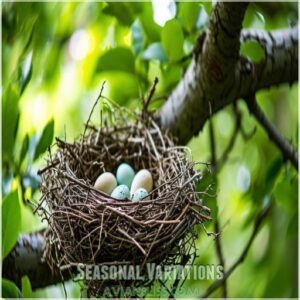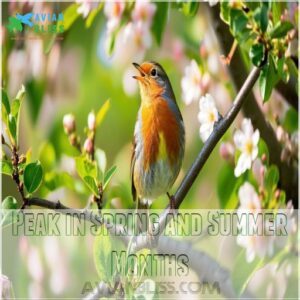This site is supported by our readers. We may earn a commission, at no cost to you, if you purchase through links.

This dawn chorus isn’t just a random concert – it’s a sophisticated communication system.
Birds take advantage of the still, cool air at daybreak when sound travels farther, making it the perfect time to defend territory and attract mates.
Male birds especially use this quiet time to show off their vocal prowess and health to potential partners.
Think of it as their morning social media update, broadcasting their status to the neighborhood.
There’s more to these melodic messages than meets the ear.
Table Of Contents
- Key Takeaways
- Bird Chirping in The Morning
- Why Do Birds Sing in The Morning
- The Dawn Chorus Explained
- Types of Bird Chirps and Their Meanings
- Factors Influencing Bird Chirping Patterns
- Importance of The Dawn Chorus
- Timing of The Dawn Chorus
- Science Behind Morning Bird Chirping
- Environmental Impact on Bird Chirping
- Appreciating Morning Bird Songs
- Frequently Asked Questions (FAQs)
- Why do birds chirp in the morning?
- Why do birds sing in the morning?
- Why do birds chirp at dawn?
- When do birds chirp?
- What does it mean when you hear birds chirping in the morning?
- Why do birds sing so loudly in the morning?
- Why do birds make noise at 5am?
- What is the first bird to chirp in the morning?
- Can excessive morning bird chirping disrupt human sleep?
- Do indoor birds chirp at the same times?
- Which bird species typically sing first each morning?
- How do weather changes affect morning bird songs?
- Do birds chirp differently in urban versus rural areas?
- Conclusion
Key Takeaways
- You’ll hear birds chirping at dawn because the cool, still air helps their songs travel farther, making it the perfect time for them to communicate across distances.
- Birds use their morning songs to defend territory and attract mates, essentially creating a natural "social network" where males advertise their health and availability.
- The dawn chorus isn’t random – it’s a synchronized performance where different species take turns singing, starting with robins around 4 AM and gradually building into a full concert.
- You’ll notice urban birds often sing at night too, like nocturnal bird chirping, showing how they adapt to environmental changes, and they also chirp earlier and louder than their rural counterparts to overcome city noise and light pollution, showing how they adapt to environmental changes.
Bird Chirping in The Morning
In the peaceful glow of morning, birds chirp to establish their territories and warn off potential intruders.
It’s like nature’s version of a "No Trespassing" sign,
while also broadcasting their availability to attract mates and chatting with neighbors.
Establishing Territory
Ever wondered why birds are such early risers?
It’s all about staking their claim!
Their morning bird songs are powerful tools for territory defense.
Think of it as their way of shouting, "This is mine!" from the rooftops—or, you know, treetops.
These vocal boundaries aren’t just for show; they’re serious dominance displays that prevent territorial disputes.
A bird’s song broadcasts its presence, keeping rivals at bay.
It’s a key part of their survival strategy.
Attracting a Mate
In terms of attracting a mate, birds don’t hold back.
Their morning songs are an open mic night for nature’s crooners, flaunting their vocal displays to woo potential partners.
During the breeding season, these courtship rituals showcase strength and charm, aligning with female preferences.
Imagine a bird sing-off, each note aimed at winning over the perfect companion!
Communication With Other Birds
Birds often chirp in the morning to chat with their feathered friends, sharing important updates and establishing a vibrant bird community, with early morning hours typically an hour or two after sunrise being the best time for this activity, during the ideal dawn chorus time.
They use a variety of sounds, from chirps to whistles, to express flock communication and maintain social hierarchy.
You might say these avian singers have perfected their morning radio show, making sure everyone’s tuned in without needing an antenna.
Warning of Danger
Picture it: a morning symphony of tweets, suddenly interrupted by an urgent change in rhythm.
These predator alarm calls are like your home security system—helping birds warn each other of lurking dangers.
Distress signals and danger cues travel swiftly across branches, turning foliage into a dynamic fort of survival mechanisms.
This natural threat response is key to their survival and yours.
Why Do Birds Sing in The Morning
Birds sing in the morning to advertise their availability and fitness, showcasing their loud and clear tunes when it’s most effective.
You might say they’re getting ready for the day’s vocal challenges, tuning up in the quiet morning air.
Advertising Availability and Fitness
You know that peaceful morning scene with birds chirping?
It’s a daily talent show where male birds flaunt their vocal complexity and song intensity.
They’re not just chirping for fun—they’re advertising their availability and fitness.
These fitness displays and mate selection cues are like nature’s version of a dating app, showcasing who’s ready for romance in the avian world.
Preparing for The Day’s Vocal Demands
Ever wonder why birds treat the crack of dawn like a rehearsal hall? It’s their vocal warm-up for the day:
- Morning practice flexes their vocal cords.
- Mimics a singer’s vocal exercise before a show.
- Acts as a pre-dawn rehearsal.
- Fine-tunes vocal conditioning for prime performance.
- Sets the stage for a harmonious day.
Environmental Factors
Early morning offers birds a unique advantage.
The quiet hours, before the world wakes, create an ideal acoustic environment for their songs to travel farther.
Less noise pollution means clearer communication.
Think of it as their own private concert!
Light pollution, however, can sometimes disrupt this natural rhythm.
Changes in climate and habitat loss also impact their singing habits.
These environmental factors strongly influence when and how birds choose to sing.
The Dawn Chorus Explained
When you hear the symphony of birds at dawn, you’re experiencing the dawn chorus, a mesmerizing display of synchronized vocalization.
It varies seasonally and sounds different in cities compared to quieter rural areas.
Synchronized Display of Bird Vocalization
In the morning, birds paint the sky with a synchronized display of vocalization, a fascinating part of avian behavior dynamics.
Imagine waking up to:
- Quiet streets as acoustic signaling begins.
- Chirps layering over the gentle breeze.
- Nature’s conversations revealing bird song complexity.
- Dawn choir evolution showcasing bird communication.
Your morning’s always got drama—without caffeine!
Creating a Symphony of Sounds
Birds don’t just chirp; they orchestrate a morning music ensemble like nature’s jazz band.
As you hear the bird choir each morning, it’s fascinating how each voice fits perfectly in sound ecology, blending to create a unique symphony.
Here’s a peek at this sonic wonder:
| Bird Type | Chirp Time | Song Style | Purpose | Sound Level |
|---|---|---|---|---|
| Blackbird | 5:00 AM | Melodic Tunes | Attraction | Moderate |
| Sparrow | 5:15 AM | Short Calls | Socializing | Loud |
| Robin | 5:30 AM | Melodious | Territory | Varied |
| Blue Jay | 5:45 AM | Calls | Warning | High |
| Warbler | 6:00 AM | Trills | Foraging Info | Soft |
Got it? It’s the daily bird song diversity at its best!
Seasonal Variations
Birdsong isn’t just about dawn symphonies; it reflects seasonal swings.
During the breeding season, when mating rituals kick into gear, chirping rises with testosterone-driven melodies. Ever watched nature’s soap opera unfold?
- Nest building gets soundtracked.
- Migration patterns shift song timings.
- Food availability tweaks vocal schedules.
- Hormones buzz louder as the sun shines longer.
Birdsong’s seasonal symphony brings life to your mornings.
Impact of Rural Vs Urban Areas
As the seasons shift, so does our awareness of morning songs.
You might’ve noticed how they sound different in the city compared to the countryside.
Noise pollution and light pollution in urban areas can mess with bird diversity and song variation.
Rural spots usually offer more natural habitats, reducing the chaos and letting birds sing freely, like nature’s own orchestra playing its morning symphony.
Types of Bird Chirps and Their Meanings
Birds have an impressive variety of chirps, each with its own purpose, from melodic songs to alarm calls.
You mightn’t know it, but that morning orchestra outside your window is actually a sophisticated conversation!
Melodic Songs
Ever wonder what those beautiful melodies mean? Many bird songs are like love letters, serenades announcing their presence and attracting a mate. Think of it as their personal dating profile!
- Each note carries a message.
- Their song’s complexity showcases their fitness.
- It’s a beautiful example of bird song evolution.
These melodic tunes are more than just pretty sounds; they’re a key part of bird communication and survival.
Songbird diversity is truly amazing!
Alarm Calls
Imagine hearing a sudden burst of chatter—those are alarm calls, nature’s very own sirens.
Birds use these predator warnings and distress signals to alert others of danger nearby.
It’s like an avian neighborhood watch, where each call serves as a defensive shout-out for survival.
These calls help protect the flock from threats, ensuring everyone stays alert and unharmed.
Courtship Calls
Courtship calls are nature’s love songs, serenading potential mates with vibrant melodies.
These bird songs play a key role in mating rituals, acting like musical bouquets in bird romances.
Each species uses its specific vocalization to stand out, showcasing its health and vitality.
It’s like an avian talent show, where a well-crafted tune secures a future with the perfect partner.
Contact Calls
Imagine this: You’re in a bustling flock, and contact calls act like your social glue.
These chirps keep birds in touch, ensuring no one gets left behind.
It’s like nature’s version of a group text—vital for communication, maintaining flock behavior, and ensuring social cohesion.
Birds use these calls to share information and coordinate movements seamlessly.
Factors Influencing Bird Chirping Patterns
You might wonder why birds seem so chatty in the morning, chirping away like they’re at a feathered family reunion.
Changes in light and temperature, hormonal fluctuations, and even city noise all have a hand in their daily song choices.
Environmental Conditions and Temperature
You’ve probably heard those melodious tunes as the sun peeks over the horizon.
Birds chirp when air density is higher and wind patterns are calm, letting their songs travel further, and, in fact, some products can even help you monitor bird chirping temperature.
Noise pollution in cities may prompt them to sing earlier while light pollution can throw their timing off.
This effective communication helps birds navigate their day from the get-go.
Hormonal Changes and Breeding Season
During breeding season, a bird’s hormones kick into high gear, turning up their morning symphony. These hormonal fluctuations trigger more frequent and complex songs, especially in males seeking mates.
Notably, this peak singing activity typically occurs between March and July, with the most intense dawn chorus happening in May and June, as discussed in the magic of dawn chorus.
It’s like nature’s version of putting your best foot forward – birds showcase their vocal talents when hormone levels peak.
Notably, these changes also influence nest-building activities and parental care behaviors in both male and female birds.
Species-Specific Behaviors
The fascinating world of bird behavior, including the distinctive morning songs of Red-winged Blackbirds, a common species found in Georgia’s black birds, reveals distinct patterns across species.
Some birds, like robins, start their morning songs earliest, while others, such as finches, join the chorus later.
Each species has its unique vocal signature, timing preferences, and territorial habits.
You’ll notice thrushes prefer solo performances, while sparrows often engage in group singing sessions.
These behaviors are deeply wired into their DNA.
Human Interactions and Noise Pollution
Along with urban development, our everyday activities have a big impact on bird behavior and their morning songs.
Modern city soundscapes, influenced by urban challenges like light pollution effects, create unique challenges for our feathered friends:
- Traffic noise forces birds to sing earlier or louder
- Construction sounds mask important mating calls
- Street lighting disrupts natural dawn chorus timing
- Air pollution affects birds’ vocal performance
These changes, such as the effects of climate change on bird migration patterns like earlier spring events, highlight how human activities reshape natural bird communication patterns and behaviors.
Importance of The Dawn Chorus
You’ll find that the dawn chorus isn’t just nature’s morning alarm clock – it’s actually a vital display where male birds advertise their fitness and defend their territories.
When you hear these morning melodies, you’re witnessing an intricate system of communication that helps birds establish their presence and attract potential mates in the quieter hours of dawn.
Defending Territory and Attracting Mates
Birds transform your early mornings into a territorial battleground, where their songs serve as both love letters and warning signals. You’ll notice males establishing their boundaries through distinctive calls, while females evaluate potential mates based on song quality.
| Behavior | Purpose | Peak Time |
|---|---|---|
| Dawn Song | Territory Defense | Pre-sunrise |
| Contact Calls | Mate Communication | Early Morning |
| Alarm Signals | Threat Warning | Throughout Day |
| Advertisement | Mate Attraction | Dawn to Mid-morning |
| Short Chips | Boundary Marking | All Day |
Demonstrating Fitness and Health
When male birds belt out their morning tunes, they’re showing off more than just their vocal prowess.
Like athletes at tryouts, their song complexity and vocal range serve as fitness indicators to potential mates.
You’ll notice stronger, healthier birds maintain longer songs with impressive variations.
Their energy levels, body size, and even feather condition all play into this natural performance, creating nature’s own American Idol competition.
Appreciation for Nature and Bird Behavior
The dawn chorus offers a natural symphony that connects you with the wild world around you.
Beyond showcasing a bird’s health and energy, these morning melodies create perfect opportunities for birdwatching and nature photography.
By listening to these daily performances, you’ll develop a deeper understanding of bird habitats and behaviors, as well as learn about the functions of bird song territorial defense.
It’s a reminder that conservation efforts help preserve these beautiful morning concerts for future generations.
Timing of The Dawn Chorus
You’ll find birds starting their morning songs between 4 and 6 AM, creating nature’s most reliable alarm clock.
The exact timing of these dawn performances varies with the seasons and your location.
So you might hear the first chirps earlier during spring breeding season or later in winter months.
Peak in Spring and Summer Months
During spring and summer months, you’ll witness nature’s most spectacular concert reach its peak.
These warmer seasons trigger a surge in breeding activity, with males pulling out all the stops to impress potential mates.
It’s like a neighborhood-wide talent show, where increased daylight hours and abundant food sources give birds extra energy to belt out their best tunes, making dawn chorus particularly vibrant.
Before Sunrise and Early Morning Hours
Countless birds begin their melodic performances well before sunrise, creating nature’s own alarm clock, with species like the American Robin known for their cheerful, whistling notes that signal spring’s arrival. You’ll notice this dawn chorus starting as early as 4 AM, when the world is still wrapped in darkness. Here’s what triggers their early morning concert, and you can learn more about birds that chirp in the morning.
- Internal biological clocks sync with the approaching dawn
- Cooler air helps their songs travel farther
- Less background noise means better communication
- Early singing gives them an advantage in territory defense
Variation by Location and Weather Conditions
Fascinating patterns emerge when you observe how dawn chorus varies across different locations and weather conditions.
Wind speed, rainfall, and temperature all play key roles in determining when birds start their morning songs.
Here’s how different factors affect bird activity:
| Location Type | Weather Impact | Bird Activity Level |
|---|---|---|
| Urban Areas | High noise, earlier start | Moderate |
| Suburban | Mixed conditions | High |
| Rural | Natural sounds dominate | Very High |
| Coastal | Wind affects timing | Variable |
| Mountain | Temperature sensitive | Weather dependent |
Science Behind Morning Bird Chirping
You’ll be amazed to learn how birds’ special throat structures and beaks work together to create their morning songs.
The cooler morning air helps their voices travel farther, making it the perfect time to advertise their presence to potential mates and rivals.
Unique Anatomy and Vocalizations
Birds’ morning songs come from an incredible mix of specialized body parts working together.
Their unique vocal organ, called the syrinx, sits at the bottom of their windpipe.
It’s like having two voices at once!
Combined with specially shaped beaks and flexible throats, birds can produce an amazing range of sounds.
You might say they’re nature’s best-equipped musicians, carrying their instruments everywhere they go.
Biological Significance and Avian Behavior
Morning birdsong reveals nature’s intricate behavioral patterns.
You’ll find these dawn serenades serve multiple purposes, from establishing dominance to finding potential mates.
It’s fascinating how birds have evolved to use these early hours for maximum impact – their songs travel farther in the still air, and there’s less competition from other wildlife.
As seen in post-rain chirping patterns Bird Behavior After Rain, birds use their morning melodies to communicate with their flock, sharing key information about fresh food sources and strengthening social bonds.
Think of it as nature’s most efficient networking event, happening right outside your window.
Role in Ecology and Ecosystems
The symphony of morning bird songs plays a bigger role in nature than you’d think.
These musical messages help maintain the balance of entire ecosystems, from controlling insect populations to spreading seeds across landscapes.
By deciphering the meanings behind these melodies, as explored in resources on bird songs meaning, we can better appreciate their significance.
Here’s how bird songs keep ecosystems humming:
- Warning other species about nearby predators
- Coordinating group movements during migration
- Signaling safe feeding areas to mixed-species flocks
- Maintaining territory boundaries that prevent overgrazing
Environmental Impact on Bird Chirping
You’ll notice that birds in your neighborhood have changed their morning chirping patterns due to increasing city noise and artificial lighting.
While cooler morning air once played a key role in bird songs carrying further, scientists now know that human activities like traffic noise and light pollution are reshaping when and how our feathered friends communicate.
Effects of Noise Pollution and Light Pollution
Noise and artificial light in cities have turned our feathered friends’ natural routines upside down.
You’ll notice urban birds starting their dawn chorus earlier than their rural cousins, as they try to beat the morning traffic rush.
Streetlights trick them into thinking it’s already dawn, while constant background noise forces them to sing louder or adjust their melodies to be heard over the urban symphony.
Impact of Climate Change and Habitat Loss
Climate change‘s ripple effects are reshaping how our feathered friends communicate.
Birds often adjust their behavior in response to changes in their environment, which can be influenced by their natural migration routes. You’ll notice changes in bird migration patterns, with some species arriving earlier in spring or departing later in fall.
This shift disrupts their traditional breeding schedules and morning chorus timings.
The loss of natural habitats, such as those protected by Habitat loss products, is another factor contributing to this disruption.
As habitats shrink and food sources become unpredictable, birds adapt their dawn singing routines, creating new patterns in their morning melodies.
Human Activities and Conservation Efforts
Concerned citizens worldwide are taking action to protect our feathered friends from increasing environmental challenges. You’ll find conservation projects targeting noise reduction, habitat preservation, and light pollution control making a real difference in bird populations. Local efforts have shown remarkable success in maintaining natural dawn chorus patterns.
- Create backyard sanctuaries with native plants to provide safe spaces for birds
- Support dark-sky initiatives to reduce artificial lighting impact
- Join community noise reduction campaigns to preserve natural soundscapes
- Participate in citizen science projects to monitor local bird populations
Appreciating Morning Bird Songs
You’ll discover the fascinating science behind morning bird songs when you tune in to their melodic tunes at dawn.
As you listen to their synchronized symphony, you’ll notice how different species take turns sharing their unique calls, creating nature’s own alarm clock that signals the start of a new day.
Enhancing Mental Health and Well-being
The sweet melodies of morning birds do more than mark the start of a new day—they’re natural stress-busters for your mind and body.
As you listen to these dawn performers, your brain releases feel-good chemicals that lower anxiety and boost mood.
Here’s how different bird songs can impact your well-being:
| Bird Song Type | Mental Benefit | Physical Response |
|---|---|---|
| Gentle Warbles | Reduces Stress | Lowers Blood Pressure |
| Dawn Chorus | Improves Focus | Deepens Breathing |
| Solo Songs | Enhances Mood | Releases Endorphins |
| Rhythmic Calls | Aids Meditation | Relaxes Muscles |
| Mixed Melodies | Boosts Creativity | Calms Heart Rate |
Fostering Appreciation for Nature and Wildlife
Morning bird songs open up a world of natural wonders right in your backyard. By observing these morning melodies, you can also learn about the birds’ complex communication systems, similar to how birds use nocturnal courtship calls to attract mates during the evening.
Here’s how you can develop a deeper connection with nature:
- Start a bird-watching journal to track different species and their unique songs
- Practice nature photography during the dawn chorus
- Join local wildlife sanctuaries for guided birding tours
- Share your observations with family to spark their curiosity
These simple activities help you appreciate the intricate symphony of nature while creating lasting memories.
Promoting Conservation and Sustainability
Listening to nature’s morning symphony can inspire you to become an active participant in bird conservation.
By supporting bird-friendly cities and sustainable development, you’re helping preserve these delightful dawn serenades for future generations.
Getting involved in citizen science projects lets you contribute valuable data about bird behaviors, while making small changes in your environment—like reducing light pollution—helps protect our feathered friends against climate change impacts.
Frequently Asked Questions (FAQs)
Why do birds chirp in the morning?
Birds start their daily concert at dawn to stake their claim on territory and find potential mates.
You’ll hear them most during breeding season when they’re advertising their fitness and warning off rivals.
Why do birds sing in the morning?
You’ll hear nature’s alarm clock because male birds are busy marking their territory and wooing mates.
in the quiet dawn hours when their songs travel farther through the cool, still air.
Why do birds chirp at dawn?
Ever wonder about nature’s morning alarm clock?
The dawn chorus happens because birds take advantage of the quiet morning air to establish territories, attract mates, and communicate effectively when there’s less background noise.
When do birds chirp?
Listen for nature’s alarm clock between 4 to 6 AM when most birds start their dawn chorus.
They’ll continue chirping throughout the day, with peak activity during sunrise and another burst near sunset.
What does it mean when you hear birds chirping in the morning?
Morning melodies from birds signal serious business: they’re marking territory, seeking mates, and sharing essential information.
When you hear their dawn chorus, you’re witnessing nature’s daily ritual of survival and communication.
Why do birds sing so loudly in the morning?
Birds sing loudly at dawn because the cool, still air carries their songs further.
You’ll hear them marking territory and attracting mates when there’s less background noise to compete with their vocal displays.
Why do birds make noise at 5am?
Research shows about 70% of songbirds start their dawn chorus at 5am. You’re hearing them establish territories and attract mates when sound carries best in the cool, still morning air.
What is the first bird to chirp in the morning?
The American Robin’s melodic tune typically leads nature’s morning symphony, starting around 4 AM.
You’ll hear their distinct "cheerily, cheer up, cheer up, cheerily" call before many other feathered friends join in.
Can excessive morning bird chirping disrupt human sleep?
While you might worry about sleep disruption, morning bird chirping usually isn’t loud enough to wake most people.
If you’re sensitive to noise, using earplugs or white noise can help maintain your rest.
Do indoor birds chirp at the same times?
Indoor birds often follow their natural instincts, chirping at dawn like their wild cousins.
Indoor lighting patterns you’ve established, your schedule, and their environment will also influence vocalization throughout the day.
Which bird species typically sing first each morning?
Robins lead nature’s symphony as early risers, followed by blackbirds and song thrushes.
You’ll hear their melodic voices pierce the pre-dawn silence around 4 AM, a full hour before other songbirds join in.
How do weather changes affect morning bird songs?
Weather has a big impact on birds’ morning songs.
You’ll notice they sing less during rain and storms, but they’re quite vocal before storms arrive.
Temperature changes can shift their singing schedule earlier or later.
Do birds chirp differently in urban versus rural areas?
Like a tale of two cities, your feathered neighbors adapt their tunes.
Urban birds chirp at higher pitches and earlier times to overcome city noise,
while their rural cousins sing naturally in quieter environments.
Conclusion
Next time you hear birds chirp in the morning, you’ll understand it’s more than nature’s alarm clock – it’s a complex symphony of survival, love, and territory.
These dawn performers are sharing important messages about fitness, danger, and availability, all while taking advantage of perfect acoustic conditions.
Whether you’re an early riser or prefer to sleep in, knowing why birds chirp in the morning adds a layer of appreciation to their daily concert outside your window.


















